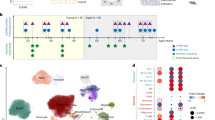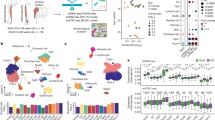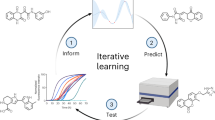Abstract
Myasthenie gravis (MG) is a disease which occurs as a consequence of an autoimmune response directed against the nicotinic acetylcholine receptor (AChR) of the myoneural junction1–3. Antisera raised against complex antigens such as AChR comprise a mixture of antibodies reactive with various determinants on the antigen molecule. The antibodies against any single determinant may be of several immunoglobulin classes and idiotypes. Antibodies produced by cloned lymphocyte–myeloma hybridoma cell lines have provided a way of analysing the diverse components making up a polyclonal antiserum4 and assessing the relative contribution made by each to the overall immune reaction in vivo5,6. We have applied this technique to the investigation of the autoimmune response in MG. We demonstrate here that certain monoclonal anti-Torpedo AChR antibodies, when injected intravenously into normal rats, induce an acute myasthenie syndrome. Thus binding of a single molecular species of antibody reactive with a single antigenic determinant can result in all of the manifestations of an autoimmune disease.
This is a preview of subscription content, access via your institution
Access options
Subscribe to this journal
Receive 51 print issues and online access
$199.00 per year
only $3.90 per issue
Buy this article
- Purchase on Springer Link
- Instant access to full article PDF
Prices may be subject to local taxes which are calculated during checkout
Similar content being viewed by others
References
Drachman, D. B. New Engl. J. Med. 298, 136–142 (1978).
Heidman, T. & Changeux, J.-P. A. Rev. Biochem. 49, 313–356 (1978).
Lindstorm, J. J. supramolec. Struct. 4, 389–403 (1976).
Kohler, G. & Milstein, C. Nature 256, 495–497 (1975).
McKearn, T. J., Sarmiento, M., Weiss, A., Stuart, I. P. & Fitch, F. W. Curr. Topics Microbiol. Immun. 81, 61–65 (1978).
Koproski, H. et al. Curr. Topics Microbiol. Immun. 81, 8–19 (1978).
Gomez, C. M. et al. Fedn Proc. 38, 1421 (1979).
Gomez, C. M. et al. Biochem. biophys. Res. Commun. 88, 575–582 (1979).
Bazin, H., Beckers, A. & Querinjean, P. Eur. J. Immun. 4, 44–48 (1974).
Burres, S. A., Richman, D. P., Crayton, J. W. & Arnason, B. G. W. Muscle Nerve 2, 186–190 (1979).
Berman, P. W. & Patrick, J. J. exp. Med. (in the press).
Burres, S. A., Crayton, J. W., Gomez, C. M. & Richman, D. P. (in preparation).
Lindstrom, J. M., Einarson, B., Lennon, V. A. & Seybold, M. E. J. exp. Med. 144, 726–727 (1976).
Lindstrom, J. M., Engel, A. G., Seybold, M. E., Lennon, V. A. & Lambert, E. H. J. exp. Med. 144, 739–753 (1976).
Kao, I. & Drachman, D. B. Science 196, 527–529 (1977).
Heinemann, S., Bevan, S., Kullberg, R., Lindstrom, J. & Rice, J. Proc. natn. Acad. Sci. U.S.A. 74, 3090–3095 (1977).
Anuyl, R., Appel, S. H. & Narahoshi, T. Nature 267, 262–263 (1977).
Drachman, D. B., Angus, C. W., Adams, R.-N., Michelson, J. D. & Hoffman, G. J. New Engl. J. Med. 298, 1116–1122 (1978).
Toyka, K. V. et al. New Engl. J. Med. 296, 125–131 (1977).
Lennon, V. A., Seybold, M. E., Lindstrom, J. M., Cochrane, C. & Ulevitch, R. J. exp. Med. 147, 973–983 (1978).
Medgyesi, G. A., Fust, G., Gergley, J. & Bazin, H. Immunochemistry 15, 125–129 (1978).
Namba, T., Nakamura, T. & Grob, D. Am. J. clin. Path. 47, 75–77 (1967).
Engel, A., Tsujibata, M., Lindstrom, J. & Lennon, V. Ann. N.Y. Acad. Sci. 274, 60–67 (1975).
Yam, L. T., Li, C. Y. & Crosby, W. H. Am. J. clin. Path. 55, 283–290 (1971).
Author information
Authors and Affiliations
Rights and permissions
About this article
Cite this article
Richman, D., Gomez, C., Berman, P. et al. Monoclonal anti-acetylcholine receptor antibodies can cause experimental myasthenia. Nature 286, 738–739 (1980). https://doi.org/10.1038/286738a0
Received:
Accepted:
Issue Date:
DOI: https://doi.org/10.1038/286738a0
This article is cited by
-
Myasthenia gravis as a prototype autoimmune receptor disease
Immunologic Research (1997)
-
Myasthenia gravis: An autoimmune response against the acetylcholine receptor
Immunologic Research (1993)
Comments
By submitting a comment you agree to abide by our Terms and Community Guidelines. If you find something abusive or that does not comply with our terms or guidelines please flag it as inappropriate.



